- Home
- Octavia E. Butler
Parable of the Sower Page 31
Parable of the Sower Read online
Page 31
He nodded. “I don’t have any objection. It isn’t a bad idea.” And a few steps later: “There’s been so much dying. There’s so much more to come.”
“Not for us, I hope.”
He said nothing for a while. Then he stopped and put his hand on my shoulder to stop me. At first he only stood looking at me, almost studying my face. “You’re so young,” he said. “It seems almost criminal that you should be so young in these terrible times. I wish you could have known this country when it was still salvageable.”
“It might survive,” I said, “changed, but still itself.”
“No.” He drew me to his side and put one arm around me. “Human beings will survive of course. Some other countries will survive. Maybe they’ll absorb what’s left of us. Or maybe we’ll just break up into a lot of little states quarreling and fighting with each other over whatever crumbs are left. That’s almost happened now with states shutting themselves off from one another, treating state lines as national borders. As bright as you are, I don’t think you understand—I don’t think you can understand what we’ve lost. Perhaps that’s a blessing.”
“God is Change,” I said.
“Olamina, that doesn’t mean anything.”
“It means everything. Everything!”
He sighed. “You know, as bad as things are, we haven’t even hit bottom yet. Starvation, disease, drug damage, and mob rule have only begun. Federal, state, and local governments still exist—in name at least—and sometimes they manage to do something more than collect taxes and send in the military. And the money is still good. That amazes me. However much more you need of it to buy anything these days, it is still accepted. That may be a hopeful sign—or perhaps it’s only more evidence of what I said: We haven’t hit bottom yet.”
“Well, the group of us here doesn’t have to sink any lower,” I said.
He shook his shaggy head, his hair, beard, and serious expression making him look more than a little like an old picture I used to have of Frederick Douglass.
“I wish I believed that,” he said. Perhaps it was his grief talking. “I don’t think we have a hope in hell of succeeding here.”
I slipped my arm around him. “Let’s go back,” I said. “We’ve got work to do.”
So today we remembered the friends and the family members we’ve lost. We spoke our individual memories and quoted Bible passages, Earthseed verses, and bits of songs and poems that were favorites of the living or the dead.
Then we buried our dead and we planted oak trees.
Afterward, we sat together and talked and ate a meal and decided to call this place Acorn.
A sower went out to sow his seed: and as he sowed, some fell by the way side; and it was trodden down, and the fowls of the air devoured it. And some fell upon a rock; and as soon as it was sprung up, it withered away because it lacked moisture. And some fell among thorns; and the thorns sprang up with it, and choked it. And others fell on good ground, and sprang up, and bore fruit an hundredfold.
The Bible
Authorized King James Version
St. Luke 8: 5-8
A Conversation with Octavia E. Butler
1. What attracted you to writing?
I’ve been telling myself stories since I was four years old. I was an only child, shy and often alone. Telling myself stories was my way of entertaining myself. It didn’t occur to me to begin to write down my stories until I was ten, when I realized I was forgetting some of my early stories. One day while my mother was combing my hair, I sat writing a story in an old half-used notebook. My mother asked me what I was doing. When I told her I was writing a story, she said, “Oh. Maybe you’ll be a writer.”
This was absolutely my first indication that people could be “writers,” but I understood the idea and accepted it at once. People could earn a living writing stories. People had been paid to write the books I enjoyed reading. The Pasadena Public Library had been one of my favorite places for years. I loved not only reading books, but being surrounded by them. For the first time in my life, I considered seriously that I might be able to do something that I enjoyed for a living—and I did enjoy writing stories. They were terrible, but I had fun with them. Until that day, “work” had been, to me, something tiresome that adults made me do. Adult work was something even more tiresome that a boss made the adult do. Work was, by definition, unpleasant. But if writing were my work…!
2. How did you wind up writing science fiction and fantasy?
I never told myself ordinary stories. I was never interested in fantasizing about the world I was stuck in. In fact, I fantasized to get away from that drab, limited world. I was a little “colored” girl in that era of conformity and segregation, the 1950s, and no matter how much I dreamed about becoming a writer, I couldn’t help seeing that my real future looked bleak. I was supposed to get married and have babies and, if I were lucky, my husband would support me and I could stay home, wash the floor, and mind the babies. If I were a little less lucky, I would have to get a job, but a job that allowed me to dress nicely and stay clean all day. I would become a secretary, perhaps. My mother, who had only been permitted three years of education, was a maid. Housecleaning was all she knew how to do. Her dream for me was that I should become a secretary. My aunt, the nurse, thought I should become a nurse. The other two occupations most open to women during those years were grade-school teacher and social worker. I knew kids who wanted to be social workers, but I wasn’t even sure what a social worker did. I knew enough, though, about secretaries, nurses, and teachers to know that for me, those jobs would be like a life sentence in hell.
I fantasized about traveling and seeing some of the things I found in the secondhand National Geographic magazines that my mother brought home. I fantasized living impossible, but interesting lives—magical lives in which I could fly like Superman, communicate with animals, control people’s minds. I became a magical horse on an island of horses. My horse friends and I made fools of the men who came to catch us.
Then when I was twelve, I discovered science fiction. It appealed to me more, even, than fantasy had because it required more thought, more research into things that fascinated me. I was developing an interest in geology and paleontology—the origin of the Earth and the development of life on Earth. The manned space program was getting started, and I was fascinated with that. My favorite class in junior high school was eighth-grade science. Other planets, evolutionary biology, botany, microbiology… I wasn’t a particularly good student, but I was an avid one, I wanted to know about everything, and as I learned, I wanted to play with the knowledge, explore it, think about what it might mean, or where it might lead, write stories about it.
I’ve never lost that fascination.
And science fiction and fantasy are so wide open that I never had to drop them to be able to pick up other things. There doesn’t seem to be any aspect of humanity or the universe around us that I can’t explore.
3. Where did the Earthseed religion come from? What inspired the belief system?
Earthseed is a result of several of my efforts and interests coming together. First, I had a great deal of trouble beginning Parable of the Sower. I knew that I wanted to tell the story, the fictional autobiography, of Lauren Olamina, who begins a new religion and who, sometime after her death—after people have had time to forget how human she was—might easily be considered a god. I wanted her to be an intelligent, believable person. I didn’t want to write satire. I didn’t want to write about a hypocrite or a fool. I wanted her to believe deeply in what she taught and I wanted her teachings to be reasonable, intellectually respectable. I wanted them to be something that someone I could admire might truly believe and teach. She didn’t have to be always right, but she had to be reasonable.
I put Earthseed together by asking myself questions and coming up with answers. For instance, I asked what was the most powerful force I could think of? What one thing could we not stop no matter how hard we tried? The answer I came up wit
h after some thought was “change.” We can do a lot of things to influence the ongoing processes of change. We can focus them, alter their speed or impact, in general we can shape change, but we can’t stop it no matter how hard we try. Throughout the universe, the ongoing reality is change.
That’s where I began. I was a bit disconcerted when I read about other religions and was reminded that in Buddhism, change was also very important, although in a different way. To put it simply, in Buddhism, since everything is ephemeral, we can avoid suffering only by avoiding attachment because all things to which we might become attached are bound to pass away. But Lauren Olamina says that since change is the one inescapable truth, change is the basic clay of our lives. In order to live constructive lives, we must learn to shape change when we can and yield to it when we must. Either way, we must learn and teach, adapt and grow.
Once I established Change as Olamina’s god, I had to be true to the idea. That meant I had to work out what such a belief would mean in the various aspects of life. I looked to science, to other philosophies and religions, and to my own observations of how people behave, how the world works.
Writing Olamina’s beliefs in verse somehow helped me get going with the novel. I hadn’t tried to write verse since I was forced to in school. I didn’t do it very well, either. But trying to do it was a good challenge. I had to focus on learning a little about this different kind of writing, and I had to figure out how to use it to do the job I wanted to do. My physical model for my character’s religious book was the Tao de Ching. It’s a slender book of a few seemingly simple verses. I didn’t want to copy any of the Taoist verses, but I immediately liked the form.
4. You’ve called Parable of the Sower a cautionary tale because the future presented in Sower is alarming, but possible. Do you have other ideas about the future that didn’t make it into the book?
The idea in Parable of the Sower and Parable of the Talents is to consider a possible future unaffected by parapsychological abilities such as telepathy or telekinesis, unaffected by alien intervention, unaffected by magic. It is to look at where we are now, what we are doing now, and to consider where some of our current behaviors and unattended problems might take us. I considered drugs and the effects of drugs on the children of drug addicts. I looked at the growing rich/poor gap, at throwaway labor, at our willingness to build and fill prisons, our reluctance to build and repair schools and libraries, and at our assault on the environment. In particular, I looked at global warming and the ways in which it’s likely to change things for us. There’s food-price driven inflation that’s likely because, as the climate changes, some of the foods we’re used to won’t grow as well in the places we’re used to growing them. Not only will temperatures be too high, not only will there not be enough water, but the increase in carbon dioxide won’t affect all plants in the same ways. Some will grow a little faster while their weeds grow a lot faster. Some will grow faster but not be as nutritious—forcing both their bests and us to need more to be decently nourished. It’s a much more complex problem than a simple increase in temperature. I considered spreading hunger as a reason for increased vulnerability to disease. And there would be less money for inoculations or treatment. Also, thanks to rising temperatures, tropical diseases like malaria and dengue would move north. I considered loss of coastline as the level of the sea rises. I imagined the United States becoming, slowly, through the combined effects of lack of foresight and short-term unenlightened self-interest, a third world country.
And our only way of cleaning up, adapting, and compensating for all this in Parable of the Sower and Parable of the Talents is to use our brains and our hands—the same tools we used to get ourselves into so much trouble.
Now in some of my other novels, Dawn, Adulthood Rites, and Imago, for instance, my Xenogenesis novels, answers come through the intervention of extrasolar aliens. Our problem as a species, we are told, results from our having two inherited characteristics that don’t work and play well together, especially since the wrong one is in control. The two characteristics are intelligence and hierarchical behavior—with hierarchical behavior dominant. The aliens fix things by altering us genetically.
In Mind of My Mind, Clay’s Ark, and related novels in my Patternist series, the future is changed by people with parapsychological abilities. It isn’t changed for the better. It simply puts another powerful group in charge and their particular shortsightedness and unenlightened self-interests bring about different changes.
These are all ideas I’ve had about the future in earlier novels. Other possibilities I’ll save for other novels.
5. What kind of research did you do for Parable of the Sower?
I read books and listened to taped classes that focused on religions. I found books on African religion and took a particular interest in the Orishas of the Yoruba people. Lauren Olamina’s middle name is Oya because I liked both the name and the Orisha the name represented. Oya is, among other things, the deity of the Niger River. She’s unpredictable, intelligent, and dangerous—a good namesake for Lauren Oya Olamina.
I indulged my weakness for specialized dictionaries and encyclopedias by falling in love with The Perennial Dictionary of World Religions. I found it at the library and liked it so much that I hunted it down and bought it.
I brushed up on guns. I had my research for my novel Clay’s Ark to fall back on there. All I had to do was dig it out and add to it a little.
I tacked detailed maps of different parts of California all over my walls. I used to travel up and down California on Greyhound buses, but I’ve never walked the length of the state. Since my characters had to do that, I had to understand how they would manage. I also read books by people who had walked the state, bicycled it, or ridden the length of it on horseback.
I listened to my local National Public Radio and Pacifica stations and read newspapers and magazines. This wasn’t so much research as my normal behavior, but because Parable of the Sower and Parable of the Talents were largely inspired by the news, by the trends that seemed important to me [see question 4], the news I absorbed fed right into the novel.
And finally, I pestered my mother, who had a green thumb, and I read books on gardening. I also took notes on my morning walks. What was in flower? What was in fruit? When? Gardening is popular in the Pasadena area. Most people who have houses have big yards, and everyone can grow something. My mother, who knew a good thing when she saw it, put me to work—so that I could get some practical experience.
6. Parable of the Sower is, among other things, a coming-of-age story. What are the most important lessons Lauren Olamina learns as she matures?
One of the first lessons Olamina learns is to value community. She learns this as a young girl, learns it without knowing she’s learning. Her father’s community is her teacher. She cannot agree with her father or other adults when they close their eyes in fear and hope to wait for the return of the good old days. But she can see that the people around her could not sustain themselves if they did not find ways to work together.
When Olamina’s birth community is destroyed, she begins to build another. She doesn’t know at first that that’s what she’s doing, and she’s afraid—terrified—of potentially dangerous strangers. But she learns to reach out in spite of her fear, to choose the best people she can find and bring them together. With her acceptance of Earthseed, she relinquishes hope for supernatural help. She recognizes a god, but not a knowing, caring, anthropomorphic entity. She believes that our only dependable help must come from ourselves and from one another. She never develops a “things will work themselves out somehow” attitude. She learns to be an activist.
7. Who or what are the most important influences on your writing?
These change from novel to novel. When I’m working on a novel, anything that catches my attention might wind up affecting the writing. Sometimes there’s an incident on a bus or on the street or in some other public place, sometimes it’s something someone says or does, or s
omething I read.
Early literary influences were fairy tales, mythology, comic books, and animal stories—especially horse stories (A Forest World; Bambi; Bambi’s Children; Black Beauty; Lad, a Dog; King of the Wind; Big Red; The Black Stallion…).
Later, I read science fiction indiscriminately. I particularly liked writers who created interesting and believable characters, but I read whoever I found at the library or in the magazines that I bought at the supermarket. My first science fiction magazines were Amazing, Fantastic, Galaxy, Analog, and The Magazine of Fantasy and Science Fiction. Some of the authors I especially liked when I was in my early teens were Theodore Sturgeon, Eric Frank Russell, Zenna Henderson, Ray Bradbury, J. T. McIntosh, Robert A. Heinlein, Clifford D. Simak, Lester del Rey, Fredric Brown, and Isaac Asimov. Later, I discovered Marion Zimmer Bradley, John Brunner, Harlan Ellison, and Arthur C. Clarke. I devoured the many anthologies of Judith Merril and Groff Conklin.
In short, like many science fiction fans, I read too much science fiction and too little of anything else. I also, as I mentioned earlier, read popular science. At school, I did very well in English and in history. History also took me to fascinatingly different places and made me think about the way people behave toward one another, the ways in which they handled power, for instance. These things held my interest and found their way into my writing.
Writers use everything. We can’t help it. Whatever touches us touches our writing.
8. What would you like readers to get from this novel? What would you like them to think about?
I hope people who read Parable of the Sower will think about where we seem to be heading—we the United States, even we the human species. Where are we going? What sort of future are we creating? Is it the kind of future you want to live in? If it isn’t, what can we do to create a better future? Individually and in groups, what can we do?

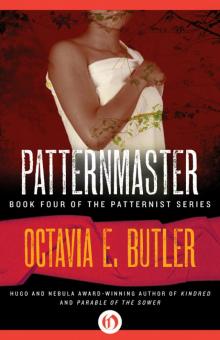 Patternmaster
Patternmaster Survivor
Survivor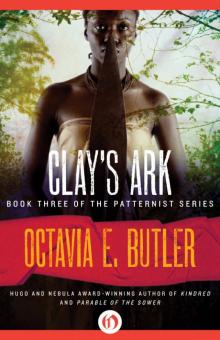 Clay's Ark
Clay's Ark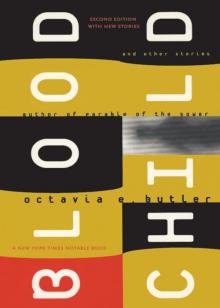 Bloodchild and Other Stories
Bloodchild and Other Stories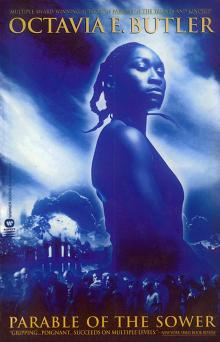 Parable of the Sower
Parable of the Sower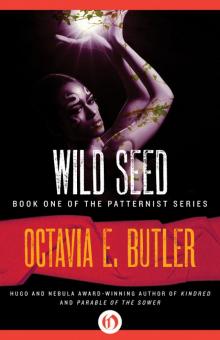 Wild Seed
Wild Seed Fledgling
Fledgling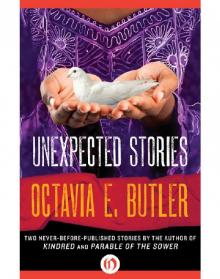 Unexpected Stories
Unexpected Stories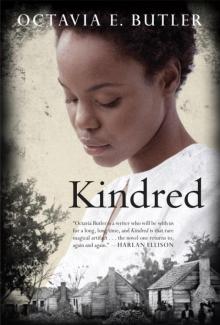 Kindred
Kindred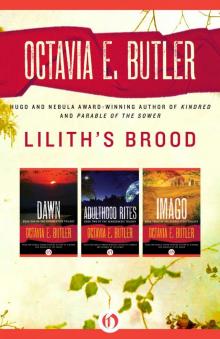 Lilith's Brood: Dawn / Adulthood Rites / Imago
Lilith's Brood: Dawn / Adulthood Rites / Imago Adulthood Rites
Adulthood Rites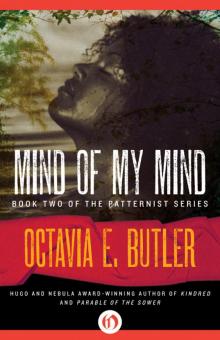 Mind of My Mind
Mind of My Mind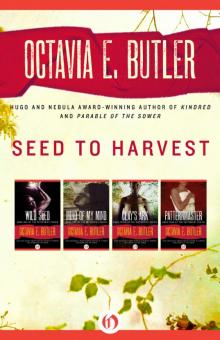 Seed to Harvest
Seed to Harvest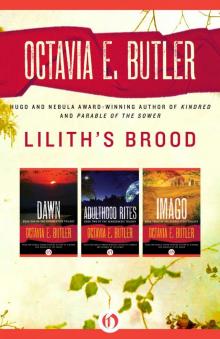 Lilith's Brood: Dawn, Adulthood Rites, and Imago (Xenogenesis Trilogy)
Lilith's Brood: Dawn, Adulthood Rites, and Imago (Xenogenesis Trilogy)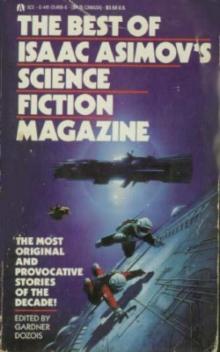 Bloodchild
Bloodchild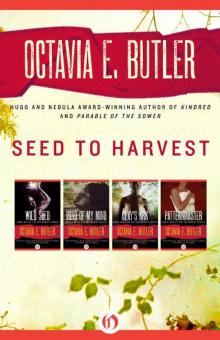 Seed to Harvest: Wild Seed, Mind of My Mind, Clay's Ark, and Patternmaster (Patternist)
Seed to Harvest: Wild Seed, Mind of My Mind, Clay's Ark, and Patternmaster (Patternist)